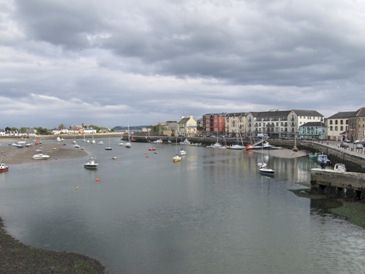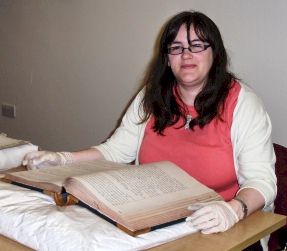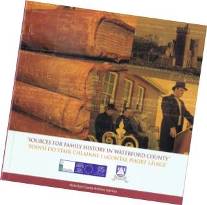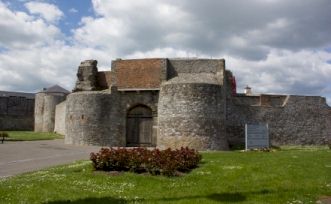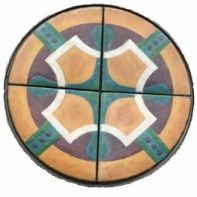 |
 |
 |
Waterford County ArchivesA is for Archives and AccessIn nearly all cases, this reluctance to cross the threshold stems from a belief that archives are the preserve of academics, a place where the search for details about the unremarkable life of Great Aunt Minnie would be perceived as trivial. This perception is completely wrong, as Archivist Joanne Rothwell of Waterford County Archives, explains: "The raison d'etre of a local authority archive is to make its collections available to as wide a public as possible. "We are here to facilitate not just academic researchers but also family historians, locals who want to know more about their area, householders who want to uncover the history and status of their homes... any sort of researcher. We don't just focus on one or two narrow groups." Joanne is based in Dungarvan, at the back of the public library on Davitts Quay which overlooks the harbour, and she's been the Archivist since 1998 when the County Archives first opened. She's originally from Kilkenny and completed the UCD Archivist course after a first degree in History and English. The role of the ArchivistAlthough her choice of studies reveals a serious interest in history, Joanne is very clear that her role is not that of local historian. Obviously she has picked up a huge amount of historical information about Waterford in the last 14 years of caring for the county's records, but she says that such knowledge is a by-product of the job, rather than part of her role. "The role of the archivist is led by the records in the archive, and the job is to make those records accessible and to facilitate researchers who want to access them. It is not to be an historian. It's very important that people understand this. The archivist has to have an overview of the history of an area, but does not need to be an expert in it – that's the job of the historian. My job is to facilitate those people so they can do their job." This makes sense when you think about it. If an archivist were an historian, they'd be more interested in pawing over the collections themselves than in providing access to them. They'd be choosing which collections to conserve and index, and they'd no doubt be giving priority to those that reflected their own preoccupations and areas of curiosity. "My ancestors came from Waterford and their surname was Power, can you help?" While her role is not that of historian, Joanne's historical knowledge is invaluable. An Archivist needs an understanding of why a particular collection or record is significant and needs conserving. And she also needs to be able to help visitors to the archive to interpret the records... to put the information they contain into context. A typical Archive visitorThe biggest single identifiable group of researchers at Waterford County Archives is, and always has been, the family historian. Local and house historians also make up a significant proportion of visitors; most are looking to prove legal land ownership through the rate books or to establish the age of a property for energy rating and insurance purposes. Although family historians have always been regular visitors, there's been a noticeable shift in their backgrounds over the years. Initially, they were more likely to be from the USA, Canada or Australia but these days there are a lot more Irish people, from Waterford or elsewhere.Joanne says that many visitors would turn up at the door with no idea where or how to start their genealogy research, or without bringing sufficient information with them to make any progress. "They'd say: 'My ancestors came from Waterford and their surname was Power, can you help?' They couldn't understand that most people in the county could say the same thing! They needed to tell me a townland or at least have some idea of when they lived here." Such visitors are fewer in number, these days, thanks in no small part to a book produced by Waterford County Archives – Sources for Family History – which sets out the sources available at the Archive and helps beginners kick start their research and prepare in advance of their visit. It can be downloaded in pdf format, too. See bottom right. Resource gems at Waterford County ArchivesLucky indeed are those family historians whose emigrant ancestors were tenants of the Lismore estate between 1815 and 1905. The landlord provided tenants who wanted to emigrate with a sum of money to help them get started in their chosen new homeland. These financial transactions were duly recorded by the estate and created an exciting collection known as the Assistance to Emigrate database. The Assistance to Emigrate Database/Celtic Tri project contains about 1,000 names of emigrants from the Lismore Estate Free and online through the Waterford County Archives website (follow the Archives projects links to the Emigration Database/Celtic Tri project), it contains about one thousand names of emigrants to England, USA, Australia.
There were also a surprising number destined for the island of Jersey, off the north coast of France.
"It's a wonderful resource," says Joanne. "A family historian who knows their ancestor's name and the country to which he or she emigrated can quickly find their townland of origin. For some entries there is even additional familial information ie 'his brother went two years ago', etc." The Board of Guardians records also hold a lot of potential. But, as with most directions taken after civil registration, church and census records, you have to physically search these collections. They're not indexed. So you have to have some idea of date, otherwise you're going to have to look through hundreds, beginning to end. And you need to have some idea of dates. Even so, Joanne says plenty of researchers have found great information in the Board of Guardians records. The Boards also assisted emigrants, particularly women going to Canada and Australia where there was a shortage of females. The Guardians bought them clothes before they left and the women were named and recorded, often with some annotation about her literacy level, needlework skills or other characteristics or abilities that made her either suitable for marriage or servitude. "If you discover an ancestor in these records, you may not get exact genealogical information, but you'll get something of use, something that adds colour to your family story." The same could be said for Valuation and Rate Books, which, save for a few gaps, are held from 1851 to 1973. These provide details of the heads of household for specific properties across those years so they're similar to the books at the Valuation Office. But there's sometimes a name-change or some additional info in the local book that's not in the Valuation Office copy. It's important to remember when looking for the less obvious family history sources that no one in the local authority or landed estate was the slightest bit interested in personal information for the sake of it. Only when your ancestor interacted with authority in some way did he or she become of any relevance. So, licencing laws might have resulted in your family appearing in documentation for owning a dog, for sheep dipping, for preparing and dispensing poisons, for showing cinema films, for playing music in dance halls... Joanne has many examples of these kinds of records on display. "Health and safety were also civil responsibilities that brought people into contact with local trading inspectors. Fire safety, of shops, boarding houses and public meeting rooms, had to be assessed, approved and certified, and registers were kept of people suffering from TB or other contagious diseases (and of staff at the Fever Hospital). University grants and scholarships were recorded, as were early 19th century road building contracts to local farmers, and payments to stonemasons, carpenters and doctors at the Workhouse. "Asking 'Where will I find my family name in the records' is all very well when you are looking for birth, baptism and census records. But beyond that type of record, you have to come at family history from a different angle. A labourer working on someone else's land is not likely to make many appearances in many records because that type of lifestyle didn't interact with the authorities much. But occasionally they did. And as time goes on, we're finding more of these examples." Landed Estates CorrespondenceWaterford County Archives holds a significant collection of Landed Estates Correspondence. This is a source that can throw light on some interesting additional details of families.
A well-run estate would take into account the personal circumstances of its tenants "Depending on the collection you can sometimes get real nitty gritty information about an ancestor," says Joanne. "It's unusual, but it does happen.
You might find an application or a letter from a tenant, or a note from an agent saying, for example, that a named tenant's chimney is smoking and needs fixing. Or the agent might have written to the landlord to say that a tenant ought to be evicted, or another tenant shouldn't be evicted because they're usually good tenants and their son has been ill...
"A well-run estate would take into account the personal circumstances of its tenants and the correspondence can give you a real sense of access to the people and the time. On occasion, the tenant would be writing in a deferential way because they were looking for every bit of help they could get. At other times they'd be feeling a bit more secure and their tone would be completely different, even demanding. "These types of correspondence will gradually become more accessible," says Joanne. "I think there's a huge role for local authorities to play in relation to making landed estate collections available." Descriptive ListsDetails of the Landed Estates Correspondence collection can be found in what is known as a Descriptive List. Such a list is prepared for all collections available to researchers at Waterford County Archives (and all other archives, come to that), so that visitors can choose the specific contents they want to study. The Descriptive Lists for Waterford's collections and many other repositories can be found at the Irish Archives Resources website. These lists have always been the modus operandi of the Archivist. "If you don't know what's in your collection, you can't make it accessible, so the Descriptive List is created as you sort through the collection. We clean the records as we go, identifying those that need the attention of a conservator, and sort the collection into a workable order. It's a slow process." And there is no quick fix. Like many other local authority archives, Waterford County Archive is a one-person repository. Occasionally, Joanne may be joined by a colleague for a fixed-term specific project (such as the creation of the Assistance to Emigrate database). So it's no surprise that the archive store is full of records that have not yet been sorted. "All archives will have records that have yet to be sorted," she says. "We try to make accessible those that will have broadest appeal as quickly as possible. We do prioritise. But the fact is that we don't have any staff, and that dictates so much. We can only do so much at a time. Obviously, this has an impact on how much we can release to the public."Joanne has at least ten collections in her wish-list of projects she'd like to see actioned. Perhaps top of her list is one that is similar to the Assistance to Emigrate database, only this second one would be of those assisted by the Poor Law Union rather than the Lismore Estate. "These cases were less 'assistance' than 'we'll put you on the boat whether you like it or not'. We'd like to create a database of records taken from all the Poor Law Unions in the county. But it's a hell of a project and not something I can do on my own. Hopefully at some point we'll get some funding to do it." While there is a lot of potential in the collections still waiting to be sorted in Joanne's storeroom, there is also a lot of potential in the collections that can now be accessed. "There isn't a tradition in Ireland of being able to access records and because these types of records haven't been available until recently, most family history researchers aren't aware of them. "So part of my role is to help people become more aware that they can look at them and to encourage them to make a visit."
|
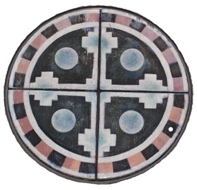

See my personal selection of the very best free online databases for Irish genealogy research. Click image.
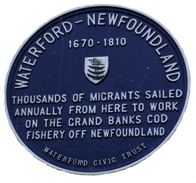
|
|
|
|
||
|
| Home Page | Disclaimer | Contact |Sitemap|Privacy Policy|
By Claire Santry, Copyright©
2008-2020 Irish-Genealogy-Toolkit.com. Dedicated to helping YOU discover your Irish Heritage.
|
||
